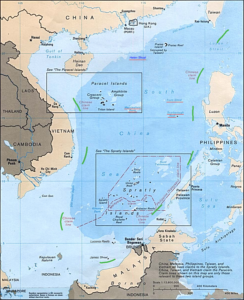Law Of The Sea: US In, China Out? Dems Push Ratification
Posted on

China’s new airstrip built over Fiery Cross Reef in the South China Sea (CSIS image)
WASHINGTON: Leading legislators from both parties welcomed today’s UN tribunal ruling against Chinese claims in the South China Sea. But while Republicans focused on China’s misdeeds, Democrats consistently brought up an American omission: The United States has never ratified the very treaty empowering the tribunal to stand up China, the UN Convention on the Law of the Sea.
UNCLOS has been in contention since the Reagan era. Republicans rejected it primarily for imposing UN bureaucracy, and potentially even taxation, over US activities such as seabed mining. President Clinton signed the implementation agreement in 1994, and the US military abides by it religiously, but the treaty itself has never been ratified by the Senate.
“We are limited in our ability to strengthen international law… if we cannot lead by example,” said Sen. Jack Reed, top Democrat on the Senate Armed Services Committee, in a rare public divergence from SASC chairman John McCain. ”The United States has not yet ratified UNCLOS, despite calls from our top military leaders who agree it will strengthen our national security. The treaty is the foundation for today’s ruling, and U.S. support for UNCLOS will be critical if we are to be successful in advocating for the rule of law throughout the region.”
Agreed Rep. Adam Smith, ranking Democrat on the House Armed Services Committee: “the United States Senate should take steps to do what the past three presidents, the U.S. Navy, and the U.S. Coast Guard have long requested: to ratify UNCLOS and to protect U.S. interests by ensuring that the United States is a full and participating party to this important international agreement.”
As a non-signatory, the US wasn’t even allowed to observe the proceedings, noted the top Democrat on the HASC seapower subcommittee, Joe Courtney. “As the United States is one of only a few countries that has not yet ratified the UN Convention on the Law of the Sea, our representatives were not allowed to participate in the adjudication process. Undoubtedly, U.S. interests were not served by the rejection of our request to observe these proceedings,” he said, before noting his — bipartisan — bill calling on the Senate to ratify the treaty, co-sponsored with Alaska Republican Don Young.
“What I think we need to do is have a debate on it,” said fellow Alaska Republican Sen. Dan Sullivan, McCain’s point man on the South China Sea. That said, Sullivan went on, “I for example have an issue with one of the provisions — it relates to something that’s very important to Alaska, a provision that allows the UN to have the authority to tax potential American mining (activities).”
A proper Senate debate, said Sullivan, could result in amendments to the objectionable provisions, as has occurred with past treaties.

The “9-dash line” describing Chinese claims to the South China Sea (Wikimedia Commons)
China Out Of UNCLOS?
Meanwhile, there’s considerable sentiment in China to withdraw from UNCLOS after the negative verdict. Beijing — and for that matter Moscow — have seen the treaty regime evolve into something they didn’t expect, said Belgian legal scholar Erik Franckx, speaking after Sullivan at the Center for Security & International Studies’ annual South China Sea conference this morning.
Binding arbitration under Annex 7 of UNCLOS has become “more and more normal,” Frankx said. It’s Annex 7 that provides for arbitration proceedings to continue even if one party refuses to show up, as China did when the Philippines filed the case resolved today. It’s also Annex 7 that says the tribunal determines itself whether it has jurisdiction, whereas China insisted it had the right to opt out. And it’s Annex 7 that declares bluntly that “The award shall be final and without appeal… It shall be complied with by the parties to the dispute.”
The ruling is “binding on all parties involved,” emphasized Sen. McCain and Sen. Sullivan in a joint statement this morning. “With today’s award, China faces a choice. China can choose to be guided by international law, institutions, and norms. Or it can choose to reject them and pursue the path of intimidation and coercion. Too often in recent years, China has chosen the latter. The world will be watching to see the choice China makes.”
Subscribe to our newsletter
Promotions, new products and sales. Directly to your inbox.
